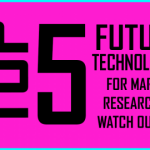Over the past six months, I’ve looked at quite a revolutionary software and hardware systems that are expected to launch in the in the next few years and are in development already, even at beta stage. Although not specifically designed for market research, these systems all have the ability to create a more engaging platform for respondents and this is my top five.
5. Next Gen Consoles
Tied in together here, the Playstation 4 and XBox One will offer faster processing speeds, making streaming of live games smoother than ever before. The hands free controller tech included whether that be Kinect or a new version of the Sony Move, will also offer greater interaction amongst users. There is also a huge shift towards social networking with the PS4 giving it’s users the ability to record parts of games and share them to Facebook and alike. The Xbox One also has some neat new features such as switching between TV and Games with voice control. The ability to therefore capture data on what people are doing whilst using these devices will become far easier as they become so interconnected with online, recordable, platforms.
4. Oculus Rift
A personal favourite of mine, the Oculus Rift could, and that’s a big ‘could’ change the way we interact with gaming forever and finally bring Virtual Reality to a point where it’s usable in the home. It’s faster, lighter and far more accessible than its predecessors in this field. Boasting almost real-time, fluid movement and a field of vision far greater than anything before it. For games, it’s a huge leap – how market research adapts to it is still too early to tell – it all depends on how many units find their way into public domain. Needless to say in terms of engagement, this surpasses anything that has come before it.
3. zSpace
Holographic technology in the home? Yes, finally. zSpace is cutting edge technology that has the capability to turn any graphic 3D design into a holographic, floating image that hovers between your screen and your glass-wear. Again, we’ll have to see just how this tech finds its way into ‘every’ home, whether that be through games consoles or as the next generation of 3D televisions, but the capacity for respondents to product test concepts that pop out from their screen is certainly one for the future.
2. Motion 3D
It does all boil down to how many people will use a device and whilst Motion 3D and movement-based tech like it are going to revolutionise gaming and TV control, it also has the capability to work within handheld devices; specifically Smartphones. Such tech is already being tested, allowing touch screen to become ‘don’t touch’ screen, with the ability to move things off screen too. Creating research tests, surveys and games through such devices will up the engagement factor no end.
1. Google Glass
As it’s still very much in the early stages with only selected people trying it out (and paying a high price to do so) Google Glass can still be considered as a Future Technology. It’s yet to be seen whether Google Glass will become as integrated into our lives as say, the iPhones have – and I have my reservations that everyone will indeed, want to walk around with these ‘Glass’ on their faces, but it certainly could happen, but no one knows especially as the reviews of the wearers are so mixed, and so is the public reaction. If so, recording data just by what we look at at any given time gives us the opportunity to catch data like never before. How long we mull over buying that washing powder in the supermarket, or how often we see a certain brand or even mention it a day – our whole lives could well about to be entirely up for data gathering. However, with so many stores in San Francisco banning Google Glass just as they fervently ban smoking, it’s a sign that potentially in other areas of the world, not everyone will want to wear these or have wearers in their stores. Especially in Market Research, we will need to create new Best Practices and understand the ethics behind not just Google Glass but the use of all these technologies for data collection purposes.
Share this blog!




![zSpace06[1]](http://www.researchthroughgaming.com/wp-content/uploads/2013/08/zSpace061-150x150.jpg)

